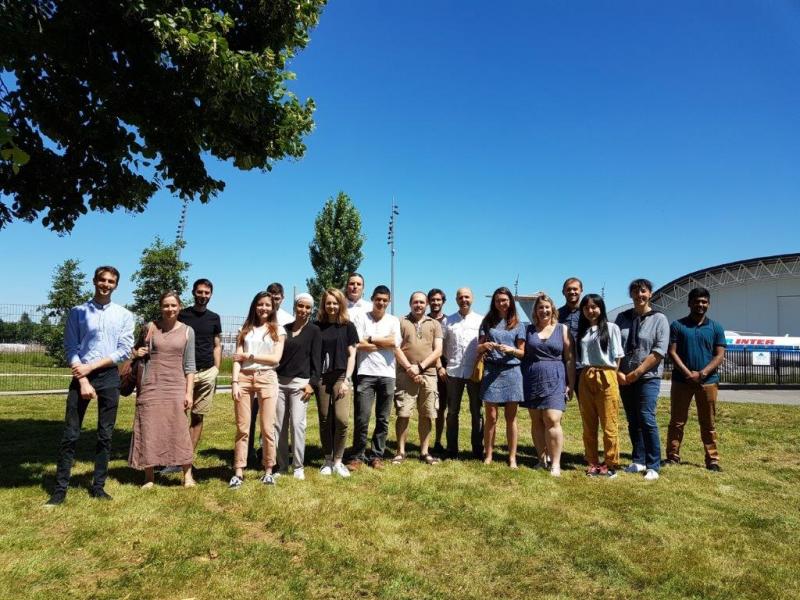Microsystems for Analysis - MICA
Head: Jérôme LAUNAY
Deputy: Vincent RAIMBAULT
PhD student representative: Camille BENE

MICA team: from materials to microdevices and systems
for multiphysics analysis of fluids (gas, liquids,..)
Direct links to research topics:
Electrochemistry in liquid phase
Electrochemistry in gas phase
Optics and magnetics : organic devices
VCSEL-based optical microsystems
Overview
The current research activities of MICA address a common objective: the micro-analysis of fluids (liquid or gas) by using or combining different transduction modes (electrochemical, electromagnetic and optical). These technologies dedicated to chemical, biochemical and biological analysis are generally built on generic platforms to address various needs and challenges in the fields of environment, health, biology or security. Our long experience in this field fostered numerous collaborations with other teams in LAAS but also with many other national and international labs (mainly chemists, biologists or physicists). Thanks to our know-how in technology, multi-physics modeling and metrology, our proven strength is our ability to study and integrate heterogeneous micro or nanostructured materials (Si, III-V semiconductors, metal oxides, polymers, organic semi-conductors...) in novel devices and to functionalize active surfaces in order to realize new prototypes of miniaturized and high performance gas, chemical and biological sensors.

Thanks to more than fifteen years of experience in micro/nanotechnologies, we develop new technological fabrication methods to integrate materials and micro/nano-structures/devices into smart microsystems.
In this context, our upstream research related to physics, electronic, chemistry and optics can be described by three interconnected parts, from advanced materials to microsystems for fluid analysis:
- Material studies (Si, III-V, organic semi-conductors, Metal oxides, polymers) to take advantage of nano-structures properties and of heterogeneous integration in order to improve transduction sensitivity and selectivity
- Single devices design and fabrication (Resistors, Capacitors, FET transistors, microelectrodes, OLEDs, MOEMS and VCSELs devices, photodiodes, magnetoresistances)
- Demonstration of innovative sensors, multi-sensors or microsystems for fluid analysis (Chem-FET, ElecCell, MOX gas sensors, integrated optical microsystems: sources, microlenses, photodetectors)
Upstream to the microsystems design and realisation, research studies deal with materials integration processes (silicon-based, polymer-based, III-V semiconductors and organic semi-conductors compounds based technologies) as well as associated properties. Furthermore, materials and their functional properties have to be considered according to a given application and therefore to a specific microdevice. This microdevice becomes finally the best test-vehicle for studying materials and processes integration according to the chosen functionality. Thus, through the development of dedicated technological platforms, microsystems realisation is finally demonstrated according to the application of interest (thanks to LAAS facilities in particular the cleanroom -as part of RENATECH network- and the CAD plateform for intensive multi-scale and multi-physics modelling). In terms of silicon, III-V and organic semi-conductors based technological research, the approach of MICA team aims to define theoretical and/or semi-empirical relations between integrated materials properties and integration process technological parameters. Accordingly, studies emphasize theory, modelling, simulation, characterization and/or use of specific microdevices. They plan to understand the main process mechanisms in order to optimize the integrated materials properties for specific applications. In terms of devices or dedicated microsystems for fluid analysis, the approach is focused on technological integration. Starting from upstream collaborations with different scientific fields as materials and processes sciences, mechanics, optics, physics, chemistry, biology…, main research activities concern design, fabrication, characterisation and optimisation of technological platforms dedicated to detection or transduction microdevices. This work aims on one part to the study of physical, chemical and biological phenomena at the microscale, and on the other part to the realization of analysis microsystems dealing with reliability, pre-series and industrial transfer. As we are also interested by reproducibility, robustness and reliability, we strive to develop for the most advanced topics prototypes with relatively high TRL levels (between 3 and 6) , that promotes our strong collaborations with industries.
We implement this strategy on our developments on microsystems for analysis in four main domains:
